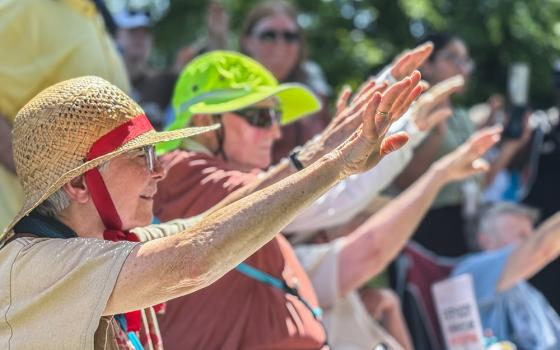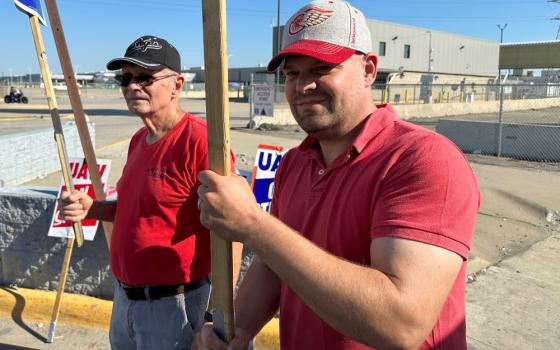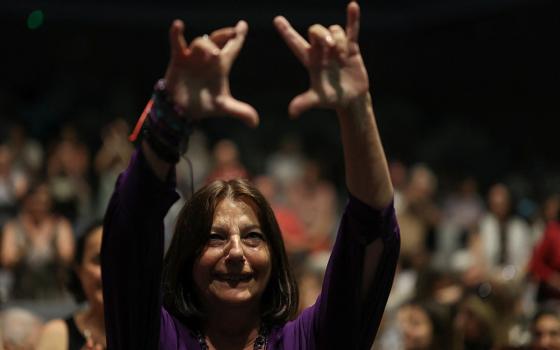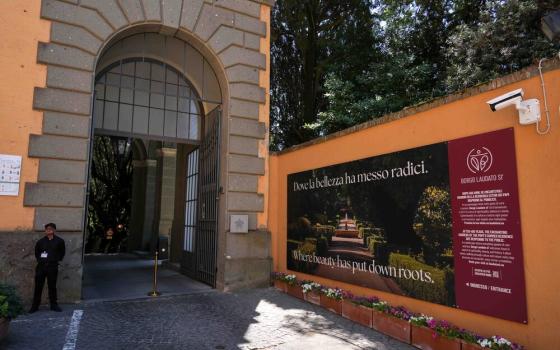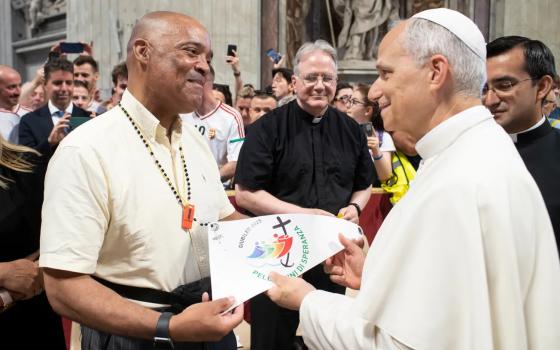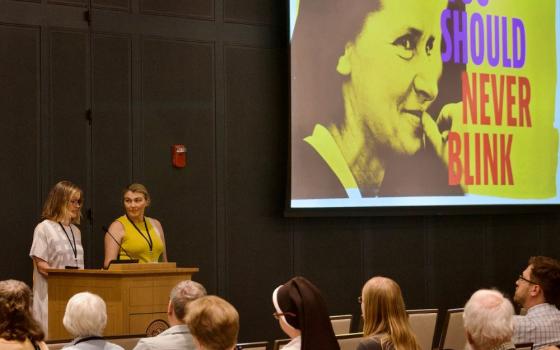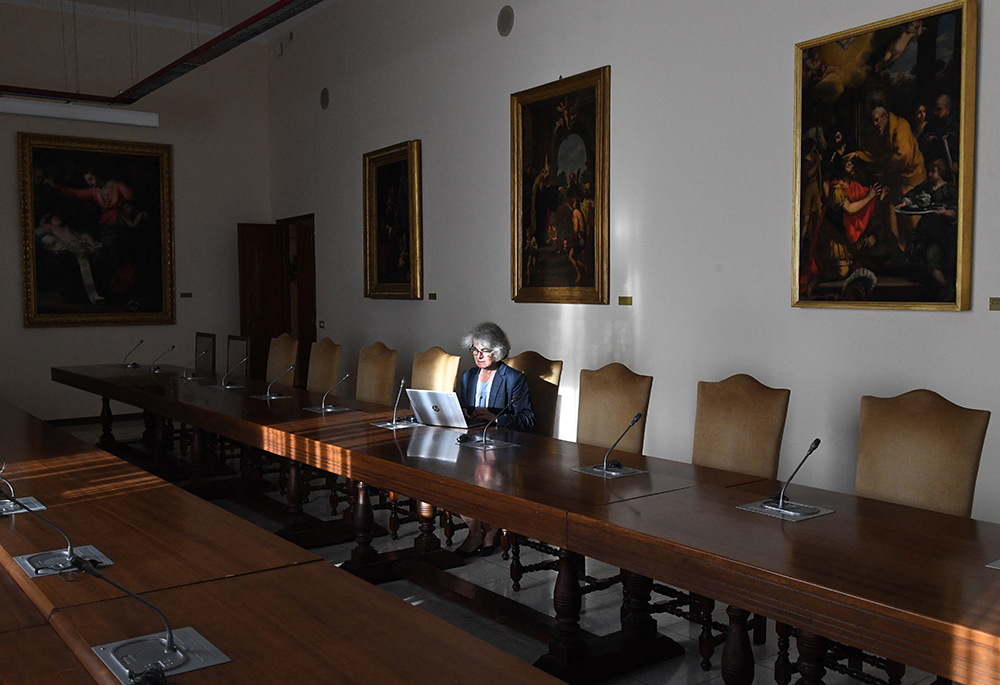
Xavière Sr. Nathalie Becquart at the General Secretariat of the Synod of Bishops Sept. 27, 2021, at the Vatican. Becquart was appointed on February 2021 as an undersecretary of the Synod of Bishops, becoming the first woman ever to hold the post and have voting rights. (AP/Sipa USA/Abaca/Erice Vandeville)
When Pope Francis met more than 850 religious sisters attending the International Union of Superiors General plenary meeting in Rome in 2019, the pope insisted that the chair for the body's then-president, Sr. Carmen Sammut, be seated right next to him.
At the time, both Sammut, a Missionary Sister of Our Lady of Africa, and those in the room were touched by the pope's deeply symbolic gesture to level the playing field.
Now, as delegates from around the globe prepare to travel again to Rome for this year's May 2-6 plenary, a wave of new appointments of sisters inside the Vatican has made it clear that Francis is backing that symbolism up with substantive changes and making room for more women religious to have a permanent seat at the table.
"Change takes time," said Sr. Patricia Murray, executive secretary of the International Union of Superiors General, which represents 600,000 sisters from around the globe.
"I entered religious life just as Vatican II was ending, so I've seen enormous changes in my over 50 years of religious life," Murray, a member of the Institute of the Blessed Virgin Mary, told Global Sisters Report. "Transformation begins really at the personal level and then affects the institution."
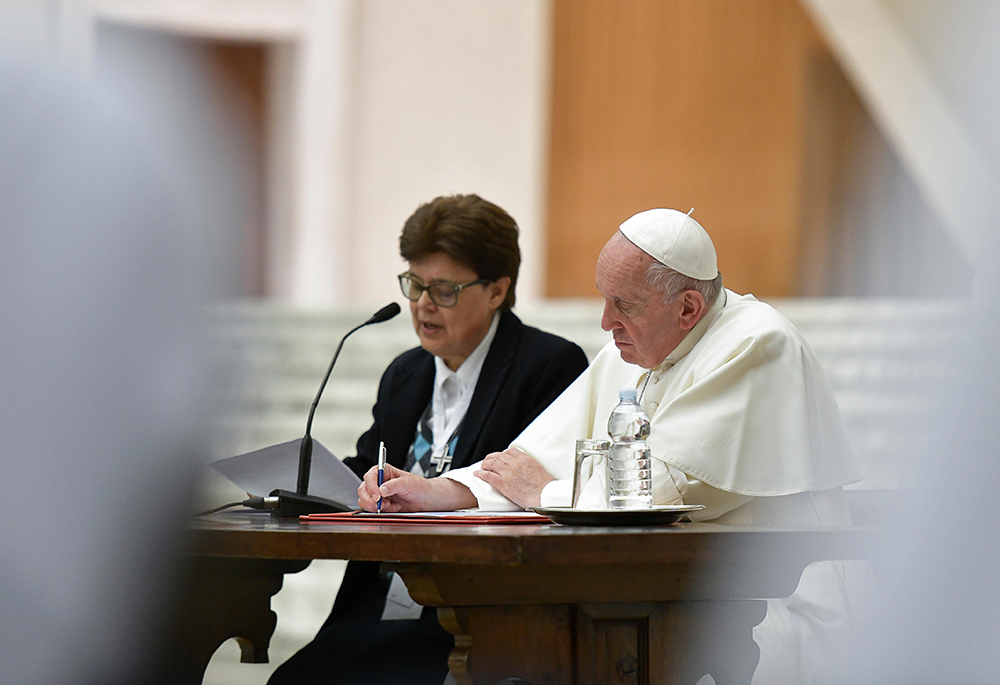
Sr. Carmen Sammut, superior general of the Missionary Sisters of Our Lady of Africa and the outgoing president of the International Union of Superiors General, gives her address alongside Pope Francis during a meeting of the organization May 10, 2019, at the Vatican. (CNS/Reuters/Vatican Media)
Much of the change has been fueled at the top by Pope Francis, who in his nearly decadelong papacy has repeatedly elevated the work of religious women. In March, the pope inaugurated a new era of governance in Catholic Church life by overhauling the Vatican's apostolic constitution to allow for laypeople to head Vatican departments.
There have been — and remain — challenges for women religious inside the Vatican, many of whom have worked behind the scenes and often at the service of cardinals and bishops with little recognition. But now, for a number of sisters, there's no doubt that changes are taking place inside an institution that has often been resistant to it.
"As we build relationships, as we learn and grow and hear different perspectives, then the institution or the ways of the institution get challenged to change," Murray said. "I do believe in change and transformation. I've seen it. I've lived it."
'As we build relationships, as we learn and grow and hear different perspectives, then the institution or the ways of the institution get challenged to change.'
—Sr. Patricia Murray
Shattering the stained-glass ceiling
When Immaculate Heart of Mary Sr. Sharon Holland arrived in Rome from the United States in 1998 to serve as a staff member to the Vatican's Congregation for Institutes of Consecrated Life and Societies of Apostolic Life, she was something of a novelty, both around the Vatican and for her fellow sisters in the United States.
"The number of well-prepared women religious has increased over the years, and surely, this has contributed to a larger number of women religious in a variety of positions throughout the curia," Holland told GSR.
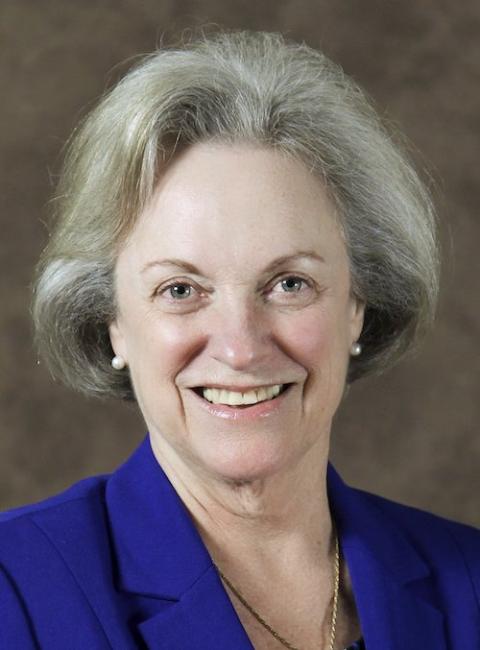
Canon lawyer Mercy Sr. Sharon Euart is a former associate general secretary of the U.S. Conference of Catholic Bishops and now the executive coordinator of the Resource Center for Religious Institutes. (CNS/Courtesy of Sharon Euart)
And for Mercy Sr. Sharon Euart, executive director of the Resource Center for Religious Institutes and former associate general secretary of the U.S. bishops' conference, that's been an "amazingly important and influential development."
Holland spent over a decade at the Vatican's congregation that oversees the world's religious orders and was succeeded by Loreto Sr. Mary Wright from Australia in 2008.
"Their visibility and the ability to talk to a woman religious has been a wonderful experience for some time now," Euart told GSR, describing the ways in which Holland, Wright and others have been allies to women religious visiting the Vatican from the English-speaking world.
"They helped translate, of course," she said of navigating the language barriers in Vatican meetings, but more than that, she said they offered advice and explained how things operate inside the Vatican departments and what works and what doesn't.
In 2019, just over 20 years after Holland's appointment, Pope Francis stunned theologians and women religious alike when he named six leaders of international religious orders and one woman who heads an institute of consecrated laywomen as full members of the Congregation for Institutes of Consecrated Life and Societies of Apostolic Life.
As members, the appointees took on a role similar to board members of a company, responsible for considering and voting on policies that directly affect sisters, a first for that Vatican department.
Today, the 2022 Vatican yearbook lists over a dozen sisters working as officials inside Vatican departments and even more as members and consultors to various dicasteries. Last year alone, Pope Francis named three sisters to high-ranking posts inside three prominent Vatican offices:
In February 2021, Pope Francis sent shockwaves through the Catholic Church by naming Becquart as one of two undersecretaries of the Vatican's General Secretariat of the Synod of Bishops.
Her appointment as the office's No. 2 means she holds the right to vote at the next synod, a first for a role traditionally held by men. Becquart, 53, had previously directed the National Service for the Evangelization of Young People and for Vocations for the French bishops' conference. Prior to joining religious life, she worked in marketing and communications.
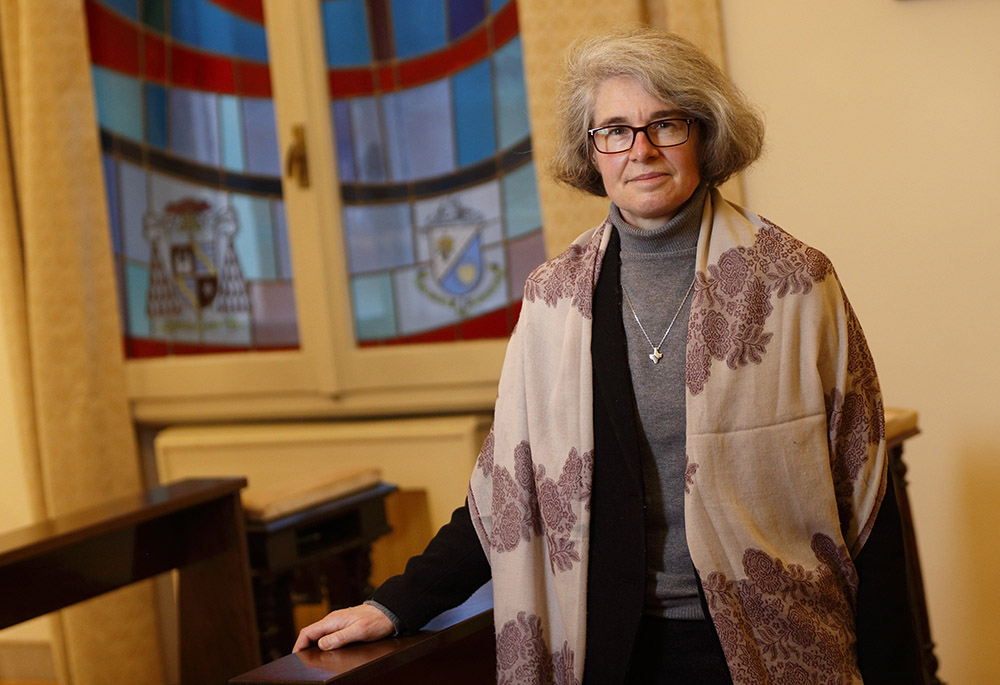
Xavière Missionary Sr. Nathalie Becquart, undersecretary of the Synod of Bishops, in the chapel at her office at the Vatican on Jan. 5 (CNS/Paul Haring)
Franciscan Sister of the Eucharist Raffaella Petrini
Pope Francis' appointment of Petrini in November 2021 as the new secretary general of the Governorate of Vatican City State made her the highest-ranking woman in the Vatican.
In her role, she is responsible for overseeing the administrative operations of the world's smallest state, which includes the Vatican museums, post office and police. Her appointment marks the first time a woman has held the position, which a bishop traditionally filled. Petrini, 53, began as an official at the Vatican's Congregation for the Evangelization of Peoples in 2005 and holds a doctorate from the Pontifical University of St. Thomas Aquinas, where she also taught.
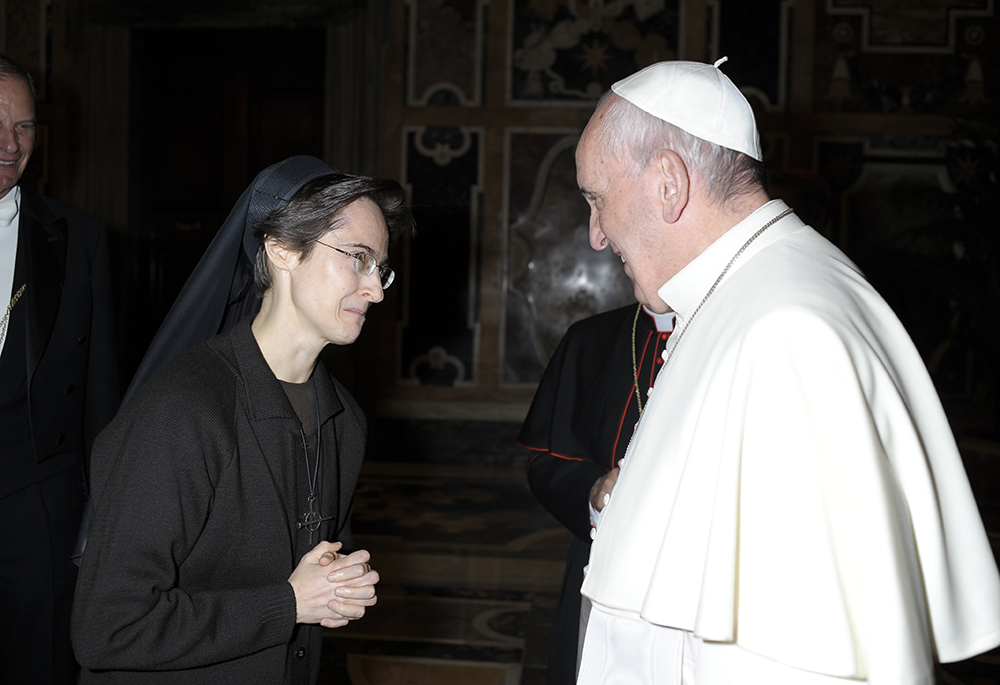
Pope Francis greets Sr. Raffaella Petrini, an Italian member of the U.S.-based Franciscan Sisters of the Eucharist, at the Vatican on Dec. 3, 2015. (CNS/Vatican Media)
Salesian Sr. Alessandra Smerilli
Prior to her appointment in August 2021 as interim secretary of the Dicastery for Promoting Integral Human Development, Smerilli was already in high demand inside the Vatican, serving as the undersecretary for faith and development at the dicastery, an adviser to the governing office of Vatican City State and a consultant to the Synod of Bishops.
On April 23, Francis made her ad interim appointment permanent. In addition to her duties of overseeing the department's expansive portfolio, the 47-year-old Italian is an economist and serves on the management team of the Vatican's COVID-19 commission.
Pope Francis with Salesian Sr. Alessandra Smerilli at the Vatican in an undated photo (CNS/Vatican Media/Courtesy of the Dicastery for Promoting Integral Human Development)
Synodality and sisters
One of the key reforms of the Francis papacy has been an emphasis on synodality in an effort to shape a more participatory church that is able to accompany all of the people of God.
For Murray, who over the last eight years has been in regular communication with sisters all around the globe, that's the necessary context to understand the pope's priorities and the rise of women religious in new positions of authority inside the church.
"I have seen an increased number of sisters, both working within the Vatican but also taking up different roles," Murray said. "And I see that in the context really of what we now understand as the synodal journey that Pope Francis has set out with an invitation to all the baptized to participate in the life of the church at many different levels."
The visible presence of more sisters and laypeople, she says, represents a church that is "moving into the future at a time of great difficulty in the world," where there's a need for as many perspectives on the way forward as possible.
"I don't see it as just taking up positions in a kind of a bureaucracy," Murray said of these roles. "I see it much more as discerning how to be Christ's presence in the world."
Advertisement
On a practical level, however, that makes for an intense workload for those responsible for implementing Pope Francis' newly revamped two-year synod process in an effort to engage as many members of the church as possible.
Over the last year, Becquart estimates she has given over 100 talks, both via videoconference and in person, as Catholic dioceses and organizations around the world have invited her to help make sense of the synod process.
While no day is standard, on the day she met with GSR at the Vatican's synod office on Rome's Via della Conciliazione, she had begun the morning with Mass; met with Cardinal Mario Grech, the prefect of the office; and given several interviews, including to a crew from a London-based BBC team. She had a Zoom conference in the United States planned for the afternoon.
Such a day is not atypical — following her high-profile appointment, she has been featured in The New York Times, The Wall Street Journal, The Associated Press and scores of other international publications.
"Because I have a vote, it means more media attention," she said, but she quickly pivoted to the fact that the church, like the world around it, is changing.
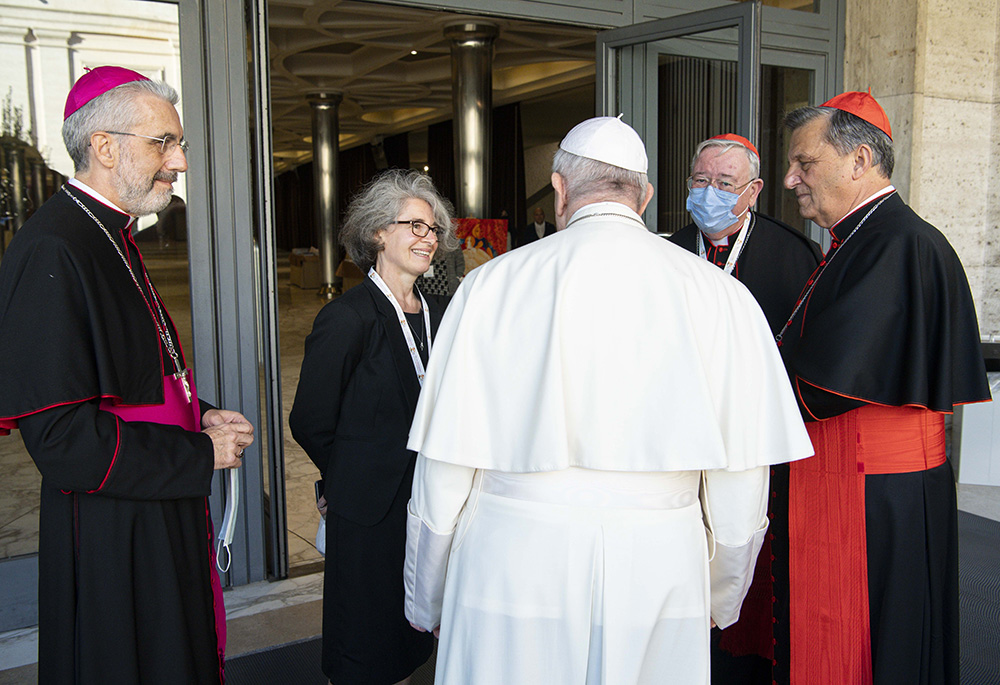
Pope Francis talks with officials of the Synod of Bishops during a meeting with representatives of bishops' conferences from around the world Oct. 9, 2021, at the Vatican. From left: Bishop Luis Marín de San Martín, undersecretary of the Synod of Bishops; Sr. Nathalie Becquart, undersecretary of the synod; Cardinal Jean-Claude Hollerich of Luxembourg, relator general of the synod; and Maltese Cardinal Mario Grech, secretary-general of the synod. (CNS/Paul Haring)
"We are not on the moon," she said. "We are a part of society," and this means the church is learning to adapt to the presence of more sisters, more female journalists covering the Vatican, and more female ambassadors to the Holy See, all of which she sees as a healthy development.
American Sr. Marie Kolbe Zamora of the Franciscan Sisters of Christian Charity, 57, also works as an official in the synod office. At the time of her interview with GSR, she was preparing for a meeting with more than 80 synod consultants from around the globe set to arrive in Rome at the end of April.
"While the reality is that the Vatican is still run by clerics," about half of the synod office is made up of women, both lay and religious, she said.
When Grech, the cardinal prefect of the office, prepares to meet with Pope Francis, Zamora says he consults her, and they walk through the documents he plans to show the pope and discuss how they might best be presented, a process she says is synodal in its own way.
"I am pleased to make this contribution at this level not even for my sake, but for women and laypeople that might come after it. It's a real privilege to do this work," she told GSR. "If I can do this work in peace and in competence for this office, hopefully it opens doors, and perhaps fears of letting in religious and laypeople will diminish."
'There is an authority I have, which is the authority of the integrity of my person, and that's probably the most important authority anybody can really have.'
—Sr. Marie Kolbe Zamora
'Where one of us is, all of us are'
In the 1990s, the U.S. bishops' conference released two major documents on the role of women in the church, at the time putting the U.S. church ahead of Rome on where it stood on the question of what roles women could and should play in church life.
"Strengthening the Bonds of Peace," which was released in 1994, encouraged church leaders to identify leadership roles that were open to women, and the follow-up document, "From Words to Deeds," in 1998 operated with the assumption that all roles are open to women unless canon law states otherwise.
While progress on this front has had its ups and downs, Euart said the appointments of Becquart, Petrini, Smerilli, Zamora and others represent "another example of how the role of women in the church is moving forward in a positive way by the fact that the Holy See is opening positions to women that do not require the sacrament of holy orders."
Holland offered a similar assessment, saying "it is increasingly recognized that many roles do not require priestly ordination."
"I would expect a continued growth of women religious and women in general at the service of the church at the Vatican," she said. "They are prepared and can become available."
"It is a flurry," said Daughter of St. Paul Sr. Bernadette Reis of these new appointments of women religious. "It says a lot in terms of both the quantity and the diversity."
Reis was "headhunted" by Vatican communications after she began as a volunteer in 2015. She became an entry-level journalist at Vatican Media in 2018, then was promoted to the assistant to director of the Holy See press office in 2019. She is now in a middle-management position coordinating news programs in over 30 languages.
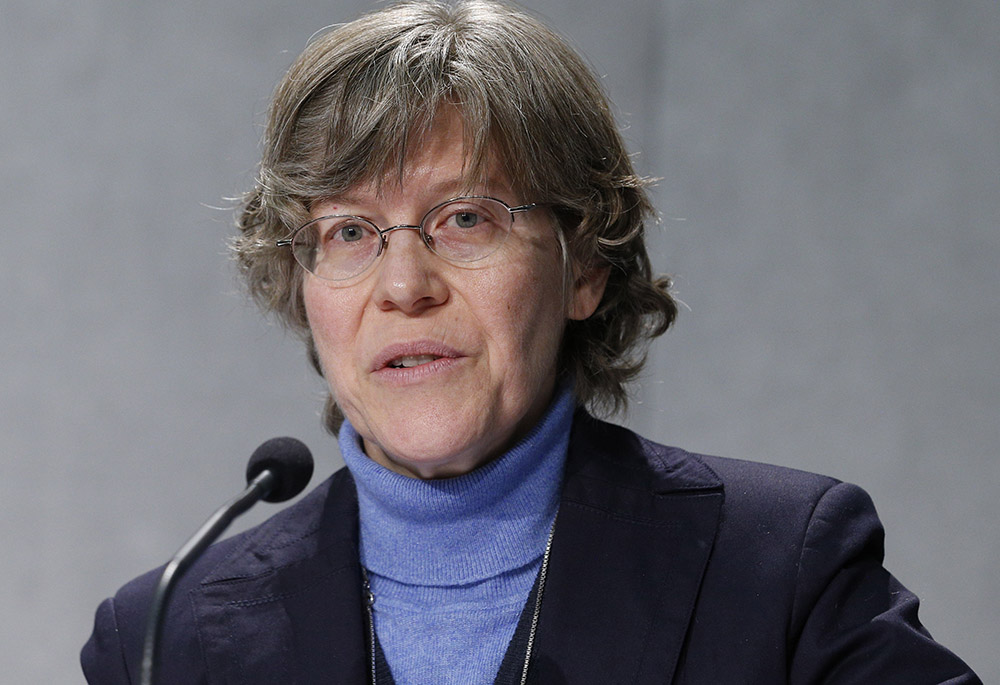
Sr. Bernadette Reis speaks at a press conference in February 2019, when she was assistant to the director of the Vatican press office. (CNS/Paul Haring)
She characterized the quick ascendancy of so many visible women religious in two ways: There's a "breadth of knowledge," but "we also represent areas of different expertise."
"When I first started there, I have to admit it was like going through culture shock because the Vatican works so differently than any other organization I've worked with," Reis said. "I had a lot to learn in terms of the culture."
Reis said despite having to learn a new approach to operations, "I have never experienced any clericalization that may take place in other parts of the Vatican."
Unlike priests, she continued, sisters "can't climb the ladder" and operate "without agendas."
"There's just a desire to give life," she said.
Zamora, who holds a doctorate in theology from Rome's Pontifical Gregorian University, said while women religious lack authority over a cleric, "there is an authority I have, which is the authority of the integrity of my person, and that's probably the most important authority anybody can really have."
"I can feel that this is enabling me and us as an office to work together," she said. "If my colleagues didn't perceive I didn't have their best interests at heart, they wouldn't collaborate."
Beyond particular competencies, the women note that there is a special distinctiveness as sisters that they bring to the way the Vatican operates.
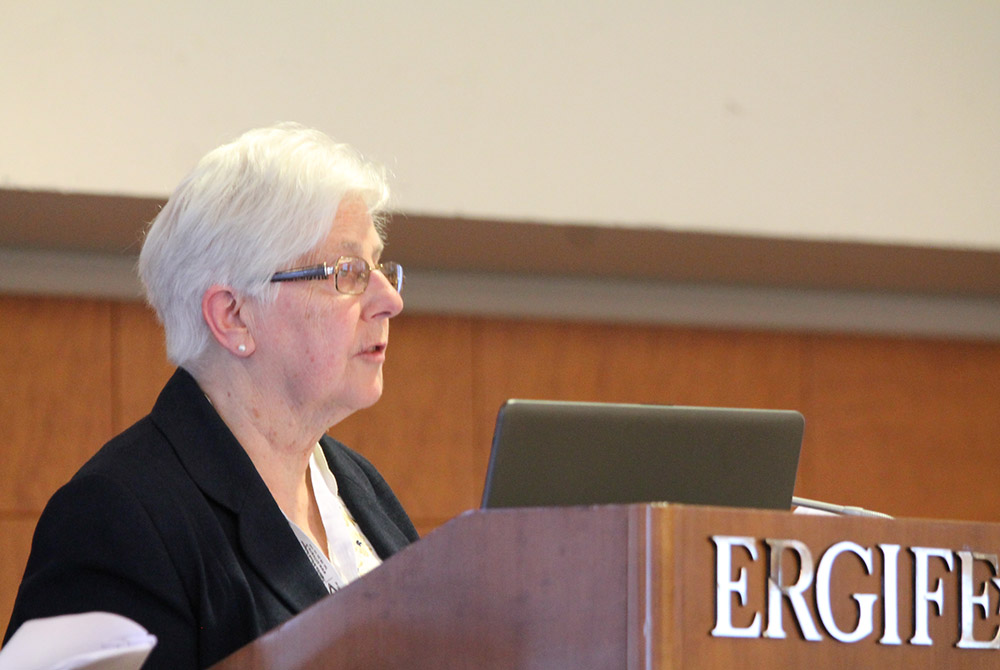
Loreto Sr. Patricia Murray, executive secretary of the International Union of Superiors General, speaks May 6, 2019, at the UISG plenary assembly in Rome. (Courtesy of UISG)
"I think because religious sisters belong to congregations, you come with the charism of your congregation," including the lived experience of the sisters from the worldwide congregation, Murray said.
"We stand on the shoulders of those who've gone before us," she continued. "It's not just your own personal journey. You're formed by the journey of the congregation, by the insight of the founder or foundress, and also by the spiritual heritage to which you belong."
Becquart concurred, noting that while she no longer lives in community, as the Xavière sisters do not have a presence in Rome, she is still "sent forth" by her mother superior and the community to work in her particular role at the Vatican.
"Our charism," she said, "is to build bridges, to help heal and reconcile. It's my entire vocation."
As Murray put it, "you don't go alone into a particular position as a sister."
"You go with this rich heritage, this rich community, with the support of prayer, with the concern but also with wisdom and advice with which you can surround yourself," she continued. "It's more than an individuality. It's the great journey of the congregation that is being offered at the Vatican."
"We often say where one of us is, all of us are," she added.
'Our charism is to build bridges, to help heal and reconcile. It's my entire vocation.'
—Xavière Sr. Nathalie Becquart
New possibilities and a new story
While the Vatican is a bureaucracy, for religious sisters, "it's also a community of believers," Murray said.
"When you have different perspectives, different voices — young and old, male and female, clerics and lay, and the voice of sisters — that makes a much richer perspective and a richer life, even in an office setting," she said.
This opening of doors, she said, calls for openness, change and transformation for everyone, which Murray said offers the "potential to learn and to grow and to be different."
Euart said much of the world is already used to seeing women taking prominent roles in other institutions, but the governance of the Vatican "is so dominated by clerics" that in 2022, it still seems like a new story.
"It's a new experience in Rome," she added, "and it's a wonderful development."


